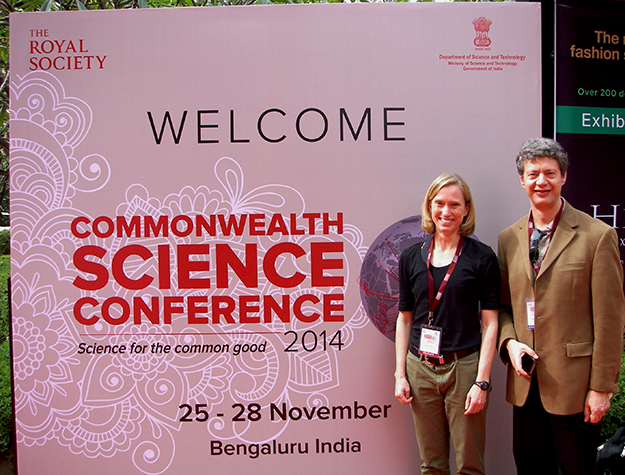McMaster delegates travel to India for Commonwealth Science Conference

McMaster researchers Marie Elliot and Gianluigi Botton travelled more than 13,00 kilometres from Hamilton to Bangalore, India to take part in the Commonwealth Science Conference — an invite-only affair that attracted some of the top scientific minds in the world. This year marked the first time the event had been held in 50 years.
For the first time in five decades, the Commonwealth Science Conference was re-launched last month.
A pair of delegates from McMaster, Marie Elliot and Gianluigi Botton, were invited to participate in the grand re-opening of the conference in Bangalore, India. The four-day affair was opened by the President of India and the Duke of York, representing the Queen of England.
Elliot is an associate professor in the Department of Biology and director of the University’s Elliot Lab. Her research focuses on multicellular development, gene regulation and antibiotic production using Streptomyces bacteria as a model system.
“It was one of the most interesting conferences I have attended on pretty much all levels,” said Elliot.
“I hadn’t ever been to India before, so this was an amazing introduction — pretty much a full-on sensory experience with the different sights, sounds and tastes. From a scientific perspective, the work presented at the conference was extremely diverse, representing all the different scientific disciplines.”
Botton is a professor in the Department of Materials Science and Engineering. He is considered an expert in transmission electron microscopy and the structural properties of nanoscale materials.
“This was one of the best conferences I attended, for the multidisciplinarity and, at the same time, specialized nature of the presentations,” added Botton.
“We had an opportunity to learn and meet the very best researchers in the world who not only do good research but also have the capacity to influence decision makers.”
The conference attracted more than 30 invited guests from Canada — along with roughly 320 other delegates from around the Commonwealth — making it one of the most culturally diverse academic conferences in the world.
The scientific focus was broad — covering everything from climate change, astronomy and material science, through to palaeontology, insect communities and global health. The event provided an outstanding opportunity for multidisciplinary discussions and new collaborations among researchers and scholars.
In addition to the core presentations, delegates were engaged in productive discussions about science translation and innovation and the state of science funding, and received valuable insight from the chief scientific advisors to various governments.
Read more about this year’s Commonwealth Science Conference in The Economist.

